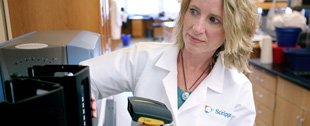Cancer
By unraveling the genomic components of cancer and translating that knowledge to the patient, scientists aim to replace the status quo of one-size-fits-all-medicine with individualized health care.

Images of normal (left) and malignant (right) human connective tissue cells in laboratory culture.
Human Tumor Sequencing
In the future, molecular diagnosis will be a hallmark oncogenic capability for each tumor, as important as the tumor’s stage and grade and will allow physicians to tailor the prognosis and therapy according to the genetic profile of each patient’s tumor. Such individualized therapy will depend on a molecular understanding of tumors.
Cancer: Distinguishing “driver”
from “passenger” genetic mutations
Each cancer is characterized by numerous somatic mutations, of which only a subset contributes to the tumor’s progression. Scientists want to be able to distinguish these “driver” mutations from the preponderance of neutral “passenger” mutations that characterize each cancer, so that they can take advantage of the wealth of data produced by the large-scale tumor resequencing studies to advance understanding and treatment of cancer.

PINK Study
While a dozen commonly occurring DNA variants are now known to be strongly associated with an increased risk for breast cancer, physicians don’t yet understand these markers’ specificity and sensitivity in predicting a woman’s lifetime risk for developing the disease.
